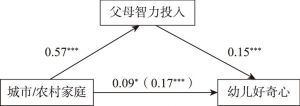论文
社会变迁背景下幼儿好奇心与父母智力投入的城乡比较研究
摘要
好奇心可以促进学习和创新,在复杂多变的现代生活中具有重要的适应价值。在社会变迁背景下,好奇心的发展势必受到生态环境、父母教养等因素的影响。本研究基于2010~2014年中国家庭追踪调查的相关数据,探讨3岁幼儿好奇心的城乡差异,并检验父母智力投入的中介作用。结果发现,城市幼儿好奇心比农村幼儿好奇心更强,但城乡差异在逐年缩小,农村幼儿好奇心在迅速增长;城市父母的智力投入比农村父母显著更多,父母智力投入在城乡环境与幼儿好奇心之间具有显著的部分中介作用。本研究揭示了幼儿好奇心与父母智力投入的社会变迁特征,提示人们在幼儿好奇心与创造力培养中应充分重视早期家庭教养的作用。
作者
周婵 ,北京体育大学教育学院讲师,北京师范大学心理学部、北京师范大学发展心理研究院博士研究生。
石慧宇 ,厦门大学新闻传播学院本科生。
葛泽宇 ,厦门大学新闻传播学院本科生。
吴胜涛 ,厦门大学社会与人类学院副教授,通讯作者,E-mail:wust 2011@163.com。
黄四林 ,北京师范大学心理学部、北京师范大学发展心理研究院教授。
林崇德 ,北京师范大学心理学部、北京师范大学发展心理研究院教授,通讯作者,E-mail:linchongdebnu@139.com。
Zhou Chan
Shi Hui-yu
Ge Ze-yu
Wu Sheng-tao
Huang Si-lin
Lin Chong-de
检索正文关键字
论文目录
-
一 前言
- (一)社会变迁与心理变迁
- (二)幼儿好奇心及其变迁
- (三)智力投入可能的中介作用
- (四)研究问题与假设
-
二 研究方法
- (一)数据来源
- (二)研究对象
- (三)研究材料
-
三 研究结果
- (一)幼儿好奇心的城乡差异与时间变迁
- (二)父母智力投入的城乡差异与时间变迁
- (三)父母智力投入的中介作用检验
- 四 讨论
查看更多>>>







